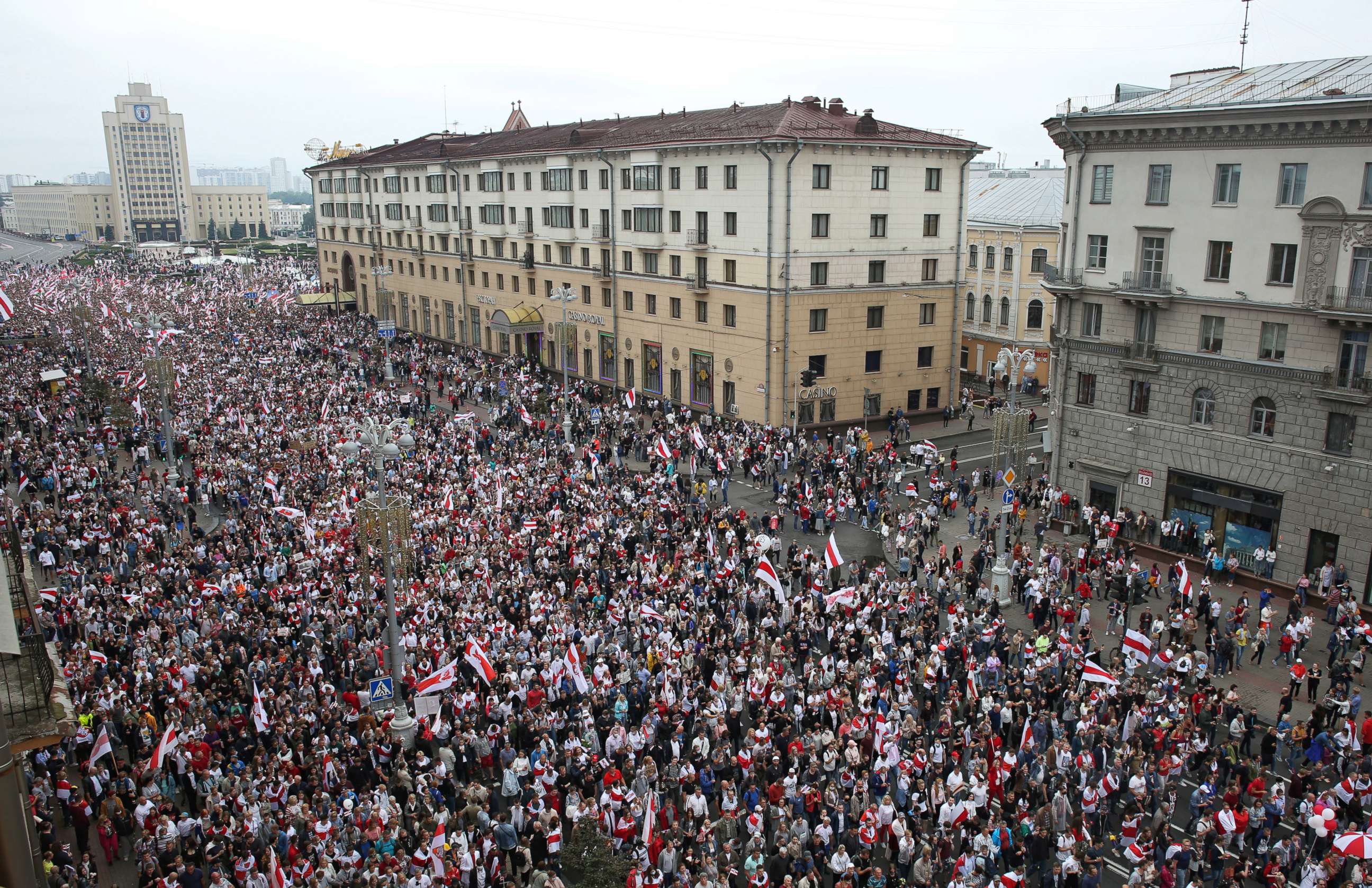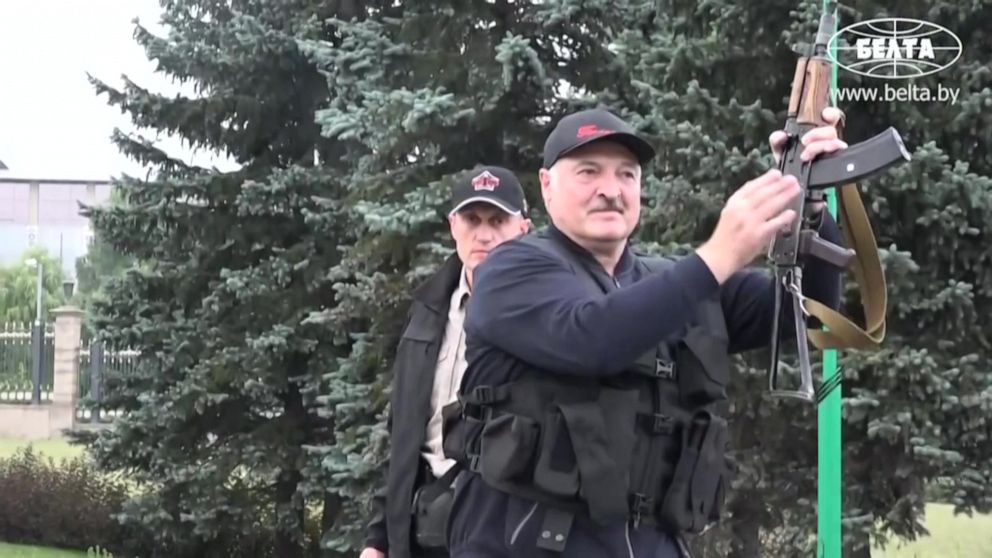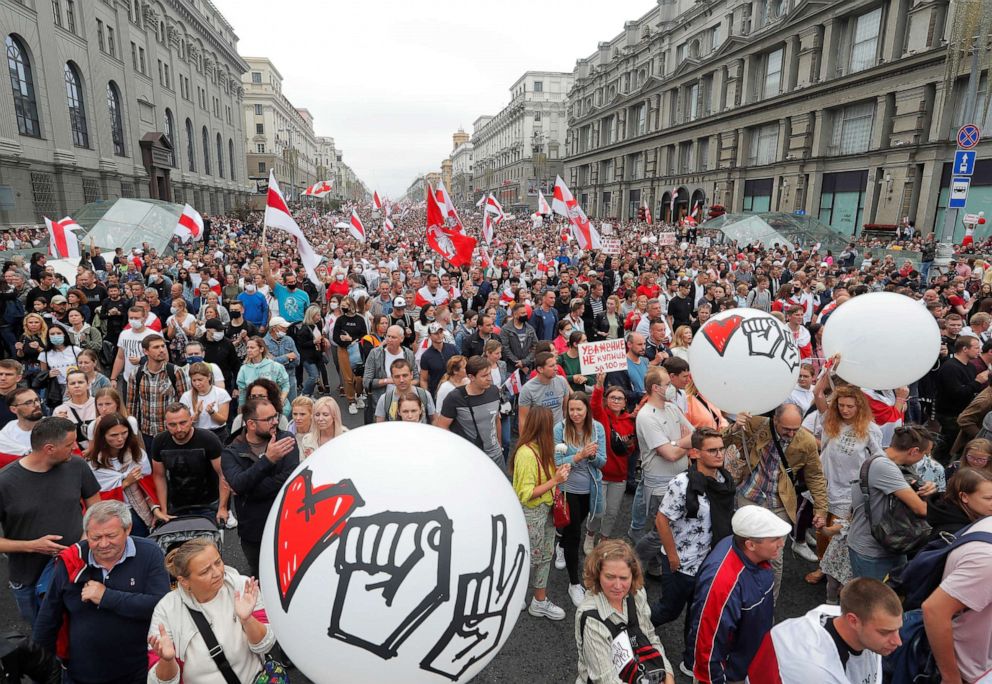Massive protests flood Belarus once more, as Lukashenko appears brandishing assault rifle
Crowds of protesters continue to grow, but the president refuses to step down.
MINSK -- A massive crowd of protesters demanding that President Alexander Lukashenko step down poured into the center of Belarus' capital, Minsk, on Sunday, for the second weekend running, in a historic display of opposition.
The protest appeared to be even larger than the historic demonstrations that swamped central Minsk last Sunday, when over a hundred thousand people took to the streets.
This time, a colossal procession of protesters marched back and forth from Minsk's central Independence Square to a monument where protesters gathered last week, filling the long avenues between them for hours with a river of red and white: the colors of the opposition. Thousands more protested in other towns and cities in Belarus.

As evening approached, thousands of protesters marched peacefully around one of Lukashenko's formal residencies, halting in front of a line of heavily armed riot police and armored vehicles.
Lukashenko himself made an appearance, landing at the complex, the Palace of Independence, in a helicopter.
In videos published by a social media channel linked to his press service, Lukashenko could be seen looking down at a small part of the protests from the helicopter, telling the pilot to get closer and saying, "They've run away like rats." After landing, he emerged from the helicopter dressed in black and holding an assault rifle, accompanied by his 15 year-old son, dressed in combat gear.

Once the protesters had left, Lukashenko was filmed walking out from behind the line of riot police, thanking the masked officers, in full black uniforms, who enthusiastically applauded him.
The massive, jubilant protests came after a week where Lukashenko's government appeared to re-assert itself, causing doubts among protesters. Strikes at some of Belarus' largest manufacturing plants appeared to sputter and, with little sign of defection from the security forces or cracks within Lukashenko's elite, many had feared people would fail to come out in protest this week.
But on Sunday, those doubts seemed to be washed away by the gigantic flood of protesters that filled central Minsk. The atmosphere was elated, with many people expressing amazement at the scale of the protests.
"I hoped for that many people, but wasn't expecting this many," Daria Nesterenko, an English teacher in the crowd said. "When there are so many together, we're not afraid. There is no fear."
She said the day made her believe, "We are ready for a longer fight. We are ready for a longer protest."
"I feel more afraid myself, of course, because there's a lot of riot police around us; but I feel also the power of our people," said Natalya, 38. "For two weeks we protest every day and I believe we will win."
The protests in Belarus have been going on for two weeks, triggered by a contested election where Lukashenko -- known as "Europe's Last Dictator," who has been in power for 26 years -- was handed a landslide victory, beating his opponent by receiving over 80% of the votes. The win drew criticism from citizens, who believe the election was rigged by Lukashenko's team.
After a brutal crackdown by security forces in the first few days, protests ballooned into the giant demonstration last weekend. The protests have continued throughout the week, but in smaller numbers.
Before the demonstration -- in a sign of the security forces' efforts to re-assert their grip -- dozens of heavily armed riot police and masked troops with batons stood in the streets nearby. Authorities also closed subway stations to try to prevent people from entering the city and a local phone provider said it had been requested to slow down the internet in parts of Minsk.
But as the crowd swelled, the police did not intervene. Troops merely blocked access to a World War II monument, known as the Stela -- on a hill where the protesters had gathered last week -- and stood behind large barriers of razor wire.
On Independence Square and the avenues, authorities played classic Soviet romance songs over the loud speaker systems set up on street lamps, perhaps to drown out the protesters. Instead, people sang along. People chanted, "Leave, leave" and "Put Lukashenko in a paddy wagon."
By night, protesters had largely cleared the streets again.

The massive scale of the protests suggests that authorities' efforts to quell them through tactics of targeted arrests and threats -- including Lukashenko's decision to tour military units -- have not been successful.
Still, strikes in factories across the country diminished, as management threatened to fire the workers. A chairman of the strike committee at the Minsk Auto Factory was detained on Thursday and other activists were also questioned or detained during the week.
Lukashenko has spent the week accusing protesters of being part of a plot by Western countries, and making wild claims that an invasion of NATO troops is imminent. On Saturday, Lukashenko, again in uniform, visited military exercises in Western Belarus. Meanwhile, the defense ministry warned its forces were on high alert and troops might be used to put down "riots."
Lukashenko's government has increasingly sought to paint the opposition as anti-Russian, accusing those against him of trying to pull the country away from Moscow and towards the West. He has pressed the line amid ongoing anxiety among protesters that the Kremlin might intervene to rescue Lukashenko, their longtime -- though often difficult -- partner.
Lukashenko this week admitted that Russian state television journalists had been flown in to Minsk to replace workers striking at Belarus' state television broadcaster.
On Sunday, Russia's foreign minister, Sergey Lavrov, criticized Belarus' main opposition leader, Svetlana Tikhanovskaya, saying that Western countries have pressured her into continuing her political activities, and noting that she's begun to make her speeches in English.
Tikhanovskaya remains in Lithuania, where she fled to under threats from the authorities after the controversial election. She has called for Lukashenko to negotiate a peaceful handover of power with the opposition and has formed a coordination council to lead the effort -- but so far, Lukashenko has rejected any dialogue.
"It is high time for our people to step over their fears, to step over all this, to step over their fears and to struggle for their freedom. Because they are ready for these changes," Tikhanovskaya told ABC News in an interview this week.
In Lithuanian on Sunday night, tens of thousands of people formed a human chain from the capital, Vilnius, to the Belarusian border, to show solidarity with the protests. The chain was meant to echo the human chains that were formed during the fall of the Soviet Union, when 2 million people linked arms to entirely encircle the Baltic States in 1989 as a peaceful protest demanding independence.




